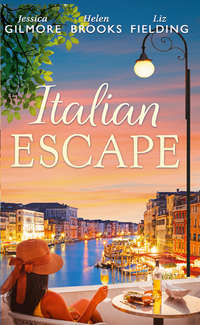
Полная версия
Her Pregnancy Bombshell
‘Sì, signora,’ he said, pulling out into the traffic with exaggerated caution.
It didn’t last.
He was a native of this ancient crossroads in the Mediterranean; his blood was a distillation of the Greek, Carthaginian and Roman invaders who had, over the millennia, conquered and controlled the island. His car was his chariot and the hoots of derision from other drivers as they passed him were an affront to his manhood.
She hung onto the strap as he put his foot down and flung the car around sharp bends, catching glimpses of the sea as they climbed up out of the city and headed across the island to Baia di Rose and the villa that guarded the headland.
She’d left London on a cold, grey day that spring had hardly touched. How many times had she and her sisters done that in the past when her grandmother had whisked the four of them out of England in the school holidays to give her mother a break?
She still remembered the excitement of arriving in a spring so different from the one they’d left behind. Being met in a sleek Italian car by Alberto who, with his wife, Elena, looked after the Villa Rosa, its gardens and acted as chauffeur to Sofia and who treated them as if they were little princesses. The exotic flowers, houses painted in soft pastels and faded terracotta and the turquoise sea glittering in invitation.
The house was only a few hundred yards up the hill from the village, perched on an outcrop in a swathe of land that stretched from the coast to the rugged, forested lands that led to the peak of the mountains in the heart of the island that King Ludano had declared as a national park.
Portia, her older and more worldly sister had shocked them all by suggesting the real reason was to keep his visits to his mistress from prying eyes.
Whatever his motive it had preserved this part of the island from commercial exploitation, the ribbon development of hotels along the east coast.
The last stretch to an elevated promontory was reached by a narrow, twisting road. As children, they’d competed to be the first to catch a glimpse of the pale pink Villa Rosa. With its tiered roof and French doors opening onto a garden that fell away to the sheltered cove below, it was so utterly different from home.
Inside was just as exciting. Endless rooms to explore and the excitement of being allowed to join grown-up parties in the vast drawing room with its arched ceiling painted in the pale blue, pink, mauves of an evening sky.
There were dusty attics filled with treasures to explore if you dared brave the spiders and, her favourite place of all, the cool covered veranda looking out to sea where you could curl up with a book in the heat of the afternoon.
When they were children the gates had stood wide open in welcome and as soon as the car came to a halt they’d tumbled out, rushed down to the beach, kicked off their shoes and socks and stood at the water’s edge, shrieking with excitement as the water ran over their feet.
Today the gates were closed and it was too early in the year to swim in the sea. Too late in the day to go down to the beach. She just wanted to curl up somewhere and sleep off the flight from London, the ferry trip across from the Italian mainland.
The driver asked her a question in something that wasn’t quite Italian, that she didn’t understand, but his look of concern suggested he was asking if she was in the right place. She nodded, smiled, paid him and waited while he turned and headed back down the hill.
Once he’d gone she took the weighty bunch of keys that Posy had given her from her bag, opened the small side gate and stepped into the peace and tranquillity of the villa courtyard.
On one side there was a low range of buildings that had once been stables but, for as long as she had been coming here, had been used as garages and storerooms. On the other side of the courtyard was the rear of the house with its scullery and kitchen. The door that, wet and sandy from the beach, they’d used as children.
It had been eight years since their last visit. She and Immi had been sixteen, Posy fifteen. Portia hadn’t come with them. She had been in her first year at uni and thought herself far too grown-up for a family holiday by the sea, even in a glamorous villa owned by the mistress of the island’s monarch.
Those years had not been kind to the villa.
King Ludano had died and Sofia had been left alone with only her memories to warm her in their love nest. Alone without her lover to call whenever something needed fixing.
It was an old house, there were storms in the winter and the occasional rumble from the unstable geology of the island.
The pink was faded and stained where rainwater had run from broken and blocked gutters. There were some tiles missing from the scullery roof and there was a crack in the wall where the stucco had fallen away and a weed had found a home.
Posy’s wonderful bequest from her godmother needed some seriously expensive TLC and she would have been lumbered with something of a white elephant if it weren’t for its location.
The Villa Rosa was the only property on this spectacular part of the coast. It had a private beach hidden from passing boats by rocky headlands that reached out into the sea like sheltering arms and, thanks to the island’s volcanic past, a pool fed by a hot spring where you could bathe even in the depths of winter.
As soon as she put it on the market she would be swamped with offers.
The sea sparkled invitingly in the low angle of the sun, but this early in March it would still be cold and all she wanted was hot mint tea and somewhere to sleep.
Tomorrow she would go down to the beach, feel the sand beneath her feet, let the cold water of the Mediterranean run over her toes. Then, like an old lady, she would go and lie up to her neck in a rock pool heated by the hot spring and let its warmth melt away the confused mix of feelings; the desperate hope that she would turn around, Cleve would be there and, somehow, everything would be back to normal.
It wasn’t going to happen and she wasn’t going to burden Cleve with this.
She’d known what she was doing when she’d chosen to see him through a crisis in the only way she knew how.
She’d seen him at his weakest, broken, weeping for all that he’d lost, and she’d left before he woke so that he wouldn’t have to face her. Struggle to find something to talk about over breakfast.
She’d known that there was only ever going to be one end to the night they’d spent together. One of them would have to walk away and it couldn’t be Cleve.
Four weeks ago she was an experienced pilot working for Goldfinch Air Services, a rapidly expanding air charter and freight company. She could have called any number of contacts and walked into another job.
Three weeks and six days ago she’d spent a night with the boss and she was about to become a cliché. Pregnant, single and grounded.
She’d told the border official that she was running away and she was, but not from a future in which there would be two of them. The baby she was carrying was a gift. She was running away from telling Cleve that she was pregnant.
He would have to know. He would want to know, but the news would devastate him.
She needed to sort out exactly what she was going to do, have a plan firmly in place, everything settled, so that when she told him the news he understood that she expected nothing. That he need do nothing...
She sorted through the keys, found one that fitted the back door. It moved a couple of inches and then stuck. Assuming that it had swollen in the winter rain, she put her shoulder to it, gave it a shove and her heart rate went through the roof as she was showered with debris.
‘Argh...’ She jumped back, brushing furiously at her hair, her shoulders, shaking herself, shaking out her hair, certain that there would be spiders...
* * *
Cleve tossed his cap onto its hook and crossed to the white board listing the flight schedule.
‘Where’s Miranda?’ he asked. ‘I don’t see her on the board.’
‘She’s taken a few weeks’ leave.’
Leave? He turned to Lucy, his office manager. ‘Since when?’
‘Yesterday afternoon. She flew down to Kent in the morning and picked up the guys from their golf tournament but she wasn’t feeling too good after lunch,’ she said, without looking up from her VDU. ‘She hasn’t been looking that great for a few days.’
‘She’s sick?’ His heart seized at the thought.
She shrugged. ‘She appears to have picked something up. The punters take exception to the pilot using the sick bags so I told her to take a few days off to get over it.’ Lucy finally sat back, looked up. ‘She hasn’t taken more than the odd day off since last summer so she decided to make it a proper break.’
‘As opposed to an improper one?’
‘Let’s hope she gets that lucky.’
He bit down hard in an effort to hold in the response that immediately leapt to his lips. ‘Why didn’t you run this by me?’
‘You’ve been in Ireland for the last three days.’
‘You’ve heard of email, text, the phone?’
‘I’ve heard you tell me not to bother you with the minor details,’ she reminded him. ‘If you want me to call and ask you to approve time off for someone who never takes a day off sick, who hasn’t had a holiday in nearly a year, then you need to start looking for a new office manager.’
‘What? No...’ Lucy might be a total grouch but he couldn’t run the office without her. ‘No, of course not, it’s just that...’ It was just that he’d finally geared up the courage to face Miranda, talk to her. ‘She’s...that is everyone...is supposed to give a month’s notice before taking time off.’
‘She could have taken a week’s sick leave,’ she pointed out, clearly not impressed with his people skills.
‘I know. I didn’t mean...’
He turned to the gallery of Goldfinch pilots on the office wall. Miranda looked back at him from her place in the top row, her calm, confident smile never failing to instil confidence in her passengers and guilt, sitting like a lump of lead in his chest, exploded.
He’d broken every rule in the book. He’d lost control, taken advantage of her kindness, behaved in a way that he would have utterly condemned in anyone else.
He’d been a wreck and Miranda’s sweet tenderness had been a healing balm, a gift that he could never repay. Her scent, the softness of her skin, her hair falling from its pins and tumbling over his skin, the life-giving sweetness of her mouth...
Every time he thought about her he was swamped with the memory of that night. Waking with her spooned against his body, the curve of her neck just inches from his lips. Fighting the temptation to rouse her with a kiss and take more of her precious warmth.
Not moving because he knew what he would see in those tender green and gold eyes.
Understanding, pity, a smile that let him off the hook and the awkwardness of a morning after that neither of them knew how to deal with.
Not moving, because the moment she woke it would be over.
He’d drifted back into the kind of sleep that had eluded him for more than a year and the next time he woke, hours later, it was to a note propped against a cold mug of tea.
I’m taking the new aircraft back to base. Take my two-seater, or the train runs hourly at seven minutes past.
See you Monday.
M.
Bright and businesslike, a forget-it-and-move-on message. He couldn’t leave it like that and he couldn’t wait for the train.
He’d flown her little aircraft back to base, his need to see her, reassure her, overriding the PTSD he’d been experiencing since Rachel’s crash. In the darkness of that night there had been no thought of protection and he needed her to know that she was safe, but by the time he touched down no one was answering at her flat and her car was gone.
She must have anticipated the possibility of him turning up at her door, tongue-tied, not knowing what to say and chosen to put some distance between them so that she could face him in the office on Monday morning as if nothing had happened.
It was, undoubtedly, the sensible thing to do and, maybe, if he’d been there on Monday, a shared look would have been enough to get them past that first awkward moment, but on Sunday night the call had come from Cyprus. His local partner had been hurt in a car crash and he’d had to fly out to take control.
He’d told himself that he would call her; he’d picked up the phone a dozen times and then put it down again. Unable to see her face, read her body language, have a clue what she was thinking, he had no idea what to say. Men were from Mars...
His father relied on flowers to cover the word gap and he’d got as far as logging onto an online florist but stalled at the first hurdle when he was invited to choose an occasion. Birthday, anniversary, every cause for celebration you could imagine. Unsurprisingly, there wasn’t an option that would cover this particular scenario.
And what flowers?
His father had been lucky—all it took was a tired bunch of chrysanthemums from the garage forecourt to provoke an eye roll, a shake of the head and a smile from his mother.
His own experience of married life suggested that nothing less than long-stemmed red roses would do if you were grovelling. No power on earth would induce him to send them to Miranda.
She deserved more. Much more. She deserved to hear him say the words. If only he could work out what they were.
He’d arrived back from Cyprus determined to clear the air but she was in the Gulf picking up a couple of mares that were booked for a visit to stud. Then he was in France and so it had gone on. Maybe it was coincidence, but if someone had arranged their schedules to keep them apart they couldn’t have done a better job.
Miranda couldn’t change his schedule, but she could swap her own around. Clearly she needed space and he’d had to allow her that.
Until today.
He’d flown back from Ireland determined that, no matter what, he’d talk to her. He still could.
‘I’ll stop by on the way home and take her some grapes,’ he said. It was okay to be concerned about someone you’d known, worked with for years. And grapes didn’t have the dangerously emotive subtext of flowers. Red, black, white—they were just grapes.
‘You’ll have a wasted journey. She checked the times of the trains to London before she left and then called her sister to let her know what time she’d be arriving.’
‘Which sister?’
‘Portia was on the box covering the post-awards parties, she’d have flown home if it was Immi, so it must be the one with the Royal Ballet.’
‘Posy. Did she say how long she’d be away?’
‘She asked me to take her off the schedule for a month.’
‘A month!’
‘She’s worked a lot of extra days covering for other people, including you. She’s owed six weeks.’ She gestured in the direction of his office. ‘Maybe she said more in the note she left on your desk.’
A cold, sick feeling hit the pit of his stomach as he saw the sealed envelope with his name written neatly in Miranda’s handwriting.
He didn’t have to open it to know that she wasn’t coming back.
He sat down, read the brief note saying that she was taking leave owed in lieu of notice. She didn’t give a reason; she didn’t have to. Determined not to let this happen, he reached for the phone.
‘Imogen, it’s Cleve Finch.’
‘Hi, Cleve. What can I do for you? There isn’t a problem with the new aircraft?’
‘No... No, it’s fine. I just need Posy’s address.’
‘Posy?’ She sounded surprised, but there was nothing guarded in her response. Evidently Miranda hadn’t shared what had happened with her twin.
‘I’m going to be in London this evening and I wanted to drop something off for Miranda,’ he said, trotting out the excuse he’d rehearsed. ‘Obviously I’d have asked her for the address but her phone appears to be switched off. She is staying with Posy?’
‘You’re kidding. Posy has a room you couldn’t swing a cat in. Andie was just dropping in to pick up the keys before catching her flight.’
‘Flight?’ So much for his plan to take her out to dinner somewhere, talk things through. ‘Where’s she gone?’
‘To L’Isola dei Fiori. Didn’t she tell you?’
‘I’ve been in Ireland all week.’
‘Oh, I see. Well, Posy inherited an amazing old house from her godmother. It’s got a fabulous conservatory and the most glorious gardens...’ Her voice trailed off. ‘I imagine they’re all overgrown.’ There was a little sigh. ‘We used to stay there in the school holidays. It was magic.’
‘I’m sure it was wonderful, but—’
‘Sorry, I was having a moment... Posy can’t get away until late summer and she’s been worried about leaving it empty so Andie’s using her leave to give it an airing. It’s a bit off the beaten track,’ she added. ‘She might not get a signal. Is it important or will it wait until she comes back?’
‘What?’
‘Whatever you were going to drop off at Posy’s?’
‘Yes... No...’
She laughed. ‘Okay...’
‘Yes, it’s important. No, it won’t wait,’ he said, quickly.
‘In that case you’ll want her address.’
CHAPTER THREE
ANDIE GATHERED HERSELF AND, having braved the door for a second time, discovered that it was the scullery ceiling that had sagged and was blocking the door.
Afraid she’d bring the whole lot down if she tried to force her way in, she trundled her wheelie and shopping around to the main entrance, found the correct heavy iron key and let herself in.
There were no worries about wet sandy feet messing up the gleaming marble tiled floor now. It was thick with dust and there was a drift of feathers where a bird must have got in through the roof and panicked.
She gave a little shiver, hoping that it had got out again.
Everywhere was shuttered. The only light was from the open door and, as the sun slid behind the mountains, that was fading fast. Using her bag to prop the door open, she crossed to a light switch but when she flicked it down nothing happened. She tried another in case it was just a duff bulb but with the same result.
She’d remembered the house as inviting, full of light, air, laughter. She’d never given a thought to how it might be in the winter, to be alone here, but the damp chill, dark shadows were weirdly creepy and suddenly this didn’t seem such a great idea.
She could manage with candles for light—there had always been tall white candles in silver holders throwing their soft light in the evenings—but she was going to need hot water to clean the place up.
If rainwater had got into the wiring she was in trouble.
She hurried through the house opening shutters, letting in what light remained before braving the cupboard under the stairs in search of a fuse box.
There was good news and bad news. The bad news was that this had to be a regular occurrence. The good news meant that there was a torch and fuse wire on top of the old-fashioned fuse box.
More bad news was that the torch battery was on its last legs and she checked the fuses as quickly as she could, found the blown one and had just finished when the torch died. She shoved it back into place and breathed a sigh of relief as a light came on in the hall.
She carried her shopping into the old-fashioned kitchen. Someone had had the sense to leave the door of the huge old fridge open. It would need a good wash down but holding her breath in case it blew another fuse, she switched it on at the mains, still holding her breath as it stuttered before reluctantly humming to life.
Better.
She tried a tap. Nothing. The same someone had sensibly turned off the water and drained the tank.
She left the taps turned fully on and looked under the sink for a stopcock. It wasn’t there and she opened the door to the scullery.
It was a mess. Directly below the damaged part of the roof the rain had seeped down through the upper floor and the ceiling was sagging dangerously and she certainly wasn’t about to risk switching on the light.
Using the little light spilling in through the kitchen door, she picked her way across the debris to the big old sink in the corner and opened the door of the cupboard beneath it.
Something scuttled across her foot and she jumped back, skin goosed, heart pounding.
It was a mouse, she told herself. Not a spider. She’d seen a tail. She was almost sure she’d seen a tail...
Swallowing hard—and desperately trying to think why she’d thought this was a good idea—she bent down and peered into the cupboard. It was too dark to see anything and too deep for her to be able to reach the stopcock without getting down on her hands and knees and sticking her head inside. She swallowed again, knelt gingerly and, with a little squeak as her face brushed against cobwebs, made a grab for the tap handle.
She was about to give it a turn when the bright beam of a torch lit up the inside of the cupboard to reveal the thick festoon of cobwebs and a startled mouse frozen in the spotlight.
Then, out of the darkness, a man’s voice rapped a sharp, ‘Come?’
Already on edge, a notch away from a scream, she leapt back, caught her head on the edge of the cupboard and saw stars.
‘Mi dispiace, signora...’
Too damn late to be sorry...
‘Don’t dispiace me!’ Andie staggered to her feet and, hand on top of her ringing head, turned furiously on the intruder. ‘What the hell do you think you’re doing?’
‘Oh, you’re English.’
‘What in the name of glory has that got to do with anything?’
‘Nothing. I’m sorry, I didn’t mean to startle you.’
‘Epic fail,’ she retaliated gamely, but her shaky voice wouldn’t have scared the mice, let alone the man standing in the doorway, blocking out what little light there was. Half blinding her with his torch. She put up her arm to shield her eyes from the glare. ‘Who are you? What are you doing here?’
‘Matthew Stark.’ He lowered the torch, took a step forward, began to offer her his hand but wisely thought better of it. ‘I’ve been keeping an eye on the villa for the owner.’
‘Oh? She didn’t mention you when I picked up the keys. Rosalind Marlowe is my sister.’
‘Rosalind?’
‘She prefers Posy.’ She would have cursed her sister for not warning her that she had appointed a caretaker but she’d carefully timed her arrival at her sister’s digs for the moment when she would be dashing off to warm up for the evening performance. Sisters had a way of looking at you and instantly knowing that something was wrong. ‘I’m Miranda Marlowe.’
‘Oh...’ He sighed with relief, clearly not that keen on evicting a squatter. ‘Of course. You were at the funeral. If she’d let me know you were arriving I would have come up earlier and turned on the water. Checked that everything was working.’
‘It was a last-minute decision and, since I’m the practical one in the family, she knew I could handle a stopcock—’ spiders were something else and, stepping back to let him in, she said, ‘—but knock yourself out, Matthew Stark.’
‘Of course.’ He stepped forward.
‘Don’t stand on the mouse,’ she warned.
‘You like mice?’
‘Not in the kitchen, but I don’t want to have to clean up the bloody body of one you’ve squashed with your size tens.’
‘Right,’ he said, his tone clearly that of a man who wished he’d stayed at home. ‘No squashed mice...’
That was one squashed mouse too many and her stomach heaved as he ducked beneath the sink. He immediately backed out again and looked up at her. Breathing through the wave of nausea, she was grateful for the dark.
‘You’d better turn the tap on or the air—’
‘It’s already done,’ she snapped.
‘Of course it is,’ he muttered.
He re-emerged from the cupboard a moment later with a cobweb decorating his hair, which made her feel marginally more generously disposed towards him.
They retreated to the kitchen; he brushed the dust off his hands. ‘Shall we start again? And it’s Matt, by the way. Nobody calls me Matthew.’









